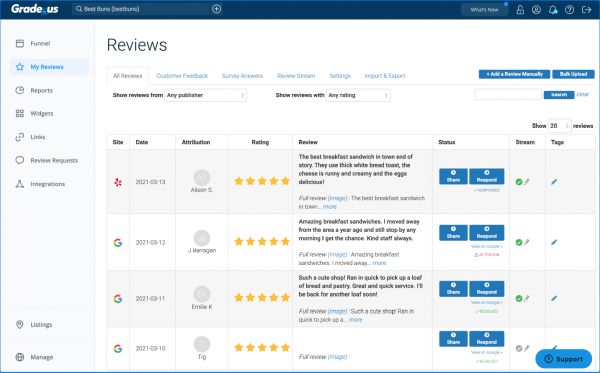How your online reputation impacts SEO.
Your online reputation can make or break your brand in the digital age. Reputation Management and SEO play vital roles in establishing and preserving a positive image online.
This guide will delve into these two essential aspects, shedding light on the best practices, techniques, and strategies to create a stellar online presence. Discover how to leverage these tools to gain credibility, authority, and trust in the digital realm.
Do Google Business Ratings Affect Local Search Ranking?
Absolutely! Google business ratings significantly influence Google’s local search ranking algorithm. When users search for local businesses or services, Google aims to provide the most relevant results based on relevance, distance, and prominence.
Prominence is a critical factor in Google’s algorithm, and it considers various aspects that demonstrate a business’s credibility and popularity.
Positive Google business ratings and customer reviews significantly influence a business’s prominence. Higher ratings and reviews suggest a reputable company that offers satisfactory products or services.
By factoring in this information, Google determines how prominently a business should be displayed in local search results. Therefore, businesses with better ratings are more likely to appear higher in local search rankings, making it easier for potential customers to choose them over competitors.
Reputation Management and SEO: Understanding the Synergy
Reputation Management and SEO work hand in hand, influencing how you or your brand are perceived online. SEO involves optimizing web content to rank higher in search engine results, improving visibility to potential audiences.
Reputation Management monitors and shapes public perception through online reviews and social media. Let’s explore how these powerful forces converge:
The Impact of SEO on Reputation Management
SEO plays a pivotal role in Reputation Management by ensuring that positive content ranks higher on search engine results.
By optimizing websites, social media profiles, and content with relevant keywords, you can steer the narrative in a positive direction, influencing your online reputation.
The Role of Reputation Management in SEO
Reputation Management contributes to SEO by building trust and credibility, crucial ranking factors for search engines.
Positive reviews and favorable content can lead to more backlinks and increased traffic, further boosting SEO efforts.
A solid online reputation can drive engagement and social signals, further enhancing search engine rankings.
Building a Strong Online Reputation
Establishing a solid online reputation requires a proactive and strategic approach. Here are crucial steps to create and maintain a positive digital presence:
- Engaging Website and Optimized Content – Ensure your website has an attractive design and easy navigation. Create valuable SEO-optimized content that resonates with your target audience and showcases your expertise.
- Utilize Social Media Effectively – Maintain an active presence on relevant social media channels. Respond promptly to comments and share valuable content, showing authenticity in your interactions.
- Monitor Online Mentions – Monitor what people say about your brand online. Utilize online tools to track mentions and reviews and address negative feedback professionally and promptly.
- Encourage Positive Reviews and Testimonials – Encourage satisfied customers to leave positive reviews and testimonials on various platforms. Positive feedback bolsters your reputation and influences potential customers’ decisions – don’t be afraid to ask!
- Acknowledge Positive Reviews Immediately – Give your customers recognition for positive feedback. A “Thank you” goes a long way in showing gratitude and appreciation for their support. It is recommended that businesses acknowledge positive feedback within 24 hours of the review being left.
- Address Negative Feedback Gracefully – Handle negative feedback gracefully and promptly, addressing the reviewer’s concerns and offering solutions. How you respond to criticism speaks volumes about your dedication to customer satisfaction.
- Reach Out – Whenever possible, contact the reviewer directly and work toward resolving the complaint. If resolved, ask the reviewer to update or remove their review.
- Leverage Influencer Marketing – Collaborate with influencers in your industry to amplify your online reputation and enhance credibility among potential customers.
How NOT to Manage Your Online Reputation
Reputation Management is critical to maintaining a positive online image for individuals and businesses. It involves proactively monitoring and shaping how others perceive you or your brand in the digital landscape.
While there are best practices to follow, there are also certain pitfalls and mistakes to avoid. Below is a list of actions you should avoid to steer clear of potential damage to your online reputation.
- Ignoring Negative Feedback – One of the biggest mistakes in Reputation Management is ignoring negative feedback or reviews. Negative comments can arise from dissatisfied customers or unhappy individuals, and ignoring them can exacerbate the situation. Instead, address negative feedback gracefully, demonstrate empathy, and offer solutions. Taking a proactive approach to resolving issues can turn a negative experience into a positive one and showcase your dedication to customer satisfaction.
- Engaging in Online Arguments – When faced with negative comments or reviews, refrain from engaging in online arguments. Responding with anger or hostility can harm your online reputation even further. Remember that your responses are visible to the public, and potential customers will take note of how you handle criticism. Respond professionally and courteously, and if necessary, take the conversation offline to resolve the matter privately.
- Buying Fake Reviews or Likes – In an attempt to boost their reputation, some businesses resort to buying fake reviews or likes. This unethical practice can lead to severe consequences if discovered. Platforms like Google and social media sites have strict policies against fake reviews and engagement manipulation. Once exposed, your brand’s credibility and trustworthiness can be irreparably damaged. Instead, focus on delivering exceptional products or services to earn positive reviews and engagement organically.
- Neglecting Social Media Presence – Social media is a powerful platform for Reputation Management, and ignoring your social media presence is a missed opportunity. Active engagement on social media allows you to interact with customers, share valuable content, and showcase your brand’s personality. Consistency and authenticity in your social media interactions can significantly impact how people perceive your brand.
- Not Monitoring Online Mentions – Failing to monitor what others are saying about you or your brand online can leave you in the dark about your online reputation. Regularly track mentions, reviews, and comments on social media, review sites, and other platforms. Being aware of your online mentions allows you to promptly address positive and negative feedback and proactively manage your reputation.
- Responding Inconsistently – Consistency in your responses is crucial in Reputation Management. Ensure your tone, message, and values are consistent across all platforms. Inconsistent responses can confuse customers and portray your brand as disorganized or insincere. Establish a clear reputation management strategy and train your team to respond consistently and professionally.
- Disregarding Privacy and Legal Considerations – When managing your online reputation, be mindful of privacy and legal considerations. Avoid disclosing confidential or sensitive data about customers, employees, or competitors. Additionally, refrain from engaging in defamation or making false claims about others, as it can lead to legal repercussions.
Reputation Management is a delicate and essential aspect of your online presence. Avoiding common mistakes can safeguard your brand’s reputation and build trust among your audience.
Do not ignore negative feedback, engage in online arguments, or resort to unethical practices like buying fake reviews. Instead, focus on authentic engagement, addressing feedback professionally, and proactively managing your online reputation.
Stay vigilant in monitoring online mentions, maintain an active social media presence, and respond consistently to maintain a positive and trustworthy online image. By avoiding these pitfalls, you can effectively manage your reputation and strengthen your brand’s online credibility.
Javelin and Grade.us: Trusted Reputation Management
At Javelin, we rely on Grade.us, a comprehensive reputation management platform with powerful features. It allows us to streamline our clients’ reputation management processes effectively.
With Grade.us, we effortlessly collect, monitor, and manage customer reviews across multiple review sites. Its review generation capabilities help us proactively solicit feedback from satisfied customers, enhancing positive reviews and credibility.
One of Grade.us’s standout features is its ability to analyze and track reviews, providing valuable customer insights. Its reporting tools allow us to generate comprehensive reports to identify areas of improvement and refine reputation management strategies.

Moreover, Grade.us seamlessly integrates with various review sites, making it a versatile and user-friendly solution for our managed service.
We leverage Grade.us to provide top-notch reputation management, responding professionally to reviews and addressing feedback to maintain positive relationships with our client’s customers.
In Conclusion
Reputation Management and SEO are indispensable for building a positive digital presence. You can establish and maintain a positive online reputation by understanding their synergy and implementing effective strategies.
Focus on engaging web content, leverage social media, and proactively monitor your online mentions. Encourage positive reviews, handle negative feedback gracefully, and consider influencer marketing to amplify your brand’s reputation.
Whether you are a business owner, entrepreneur, or individual, Reputation Management and SEO are essential tools for success in the digital realm. Embrace these practices to gain credibility, trust, and authority, driving your online presence to new heights.
At Javelin, we help you navigate this landscape and achieve your reputation management goals. Contact us today for a comprehensive analysis and discover how we can elevate your brand’s online image.
